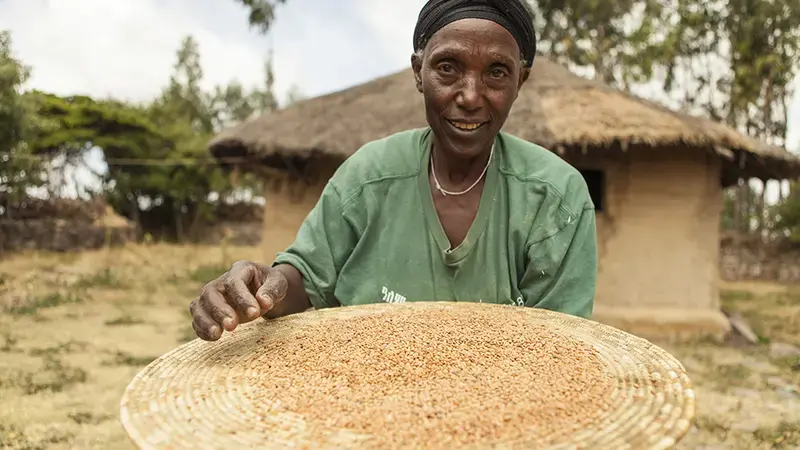New legume varieties fortify harvests and diets in Ethiopia

Demekech Tekleyohannes, an Ethiopian farmer from Gimbichu has seen her fair share of hard times. Ten years ago, a new crop disease devastated her field and her only source of livelihood.
“We had covered our fields with lentils, but within a short period of time it all got destroyed.”
A new strain of rust disease had infested the lentil crops. The local variety of lentil seeds used by the farmers had little resistance to the new disease caused by unusual weather, a growing problem with climate change. Nearly 90 percent of the farmers had lost their produce to the disease in 2005.
In response, the Ethiopian government with the help of ICARDA stepped up efforts to improve legume varieties, with support from IFAD and the Government of Netherlands.
“We provided improved germplasm and varieties of lentils, chickpeas and faba beans for testing on farmers fields,” said Dr. Zewdie Bishaw, ICARDA’s Head of Seed Unit.
The new varieties were first tested by the Ethiopian Institute of Agricultural Research (EIAR) for adaptability to the local environment, and after crossbreeding with local varieties, those with the highest yield potential were released.
Stung by past results on their fields, most farmers were reluctant to sow the new varieties as they feared it would suffer the same fate.
But Demekech stepped forward.
“After sowing the new variety, I managed to harvest nearly 1 ton from just 30kg of seeds,” she said.
Her seed was bought by EIAR for multiplication and distribution to other farmers.
Watch this farmer's story on YouTube
The new improved varieties of legumes reaped three-fold higher yields for lentils, chickpeas and faba beans on farmers' fields.
Over the years, the research partnership between ICARDA and EIAR has led to several new legume varieties and technologies adapted to local environmental conditions, which are promising high yield and resistance to disease.
Legumes are now becoming popular with the farmers. Apart from boosting yields, these crops are making their soils healthier and reducing their expenses on fertilizers.
Legumes, being rich in protein and essential minerals such as zinc, are also enriching the diets of famers’ families and boosting rural nutrition.
Today, 20 percent of Ethiopian farmers grow improved varieties from ICARDA’s project. Rust disease remains a major bottleneck to lentil production in Ethiopia, as emerging strains pose a risk to farmers every year. ICARDA continues its work with the Ethiopian government to address the challenge.
Funded by: The International Fund for Agricultural Development (IFAD) and the Government of the Netherlands
